Retro Replay Review
Gameplay
Pterodactyl thrusts you into a claustrophobic chamber of prehistoric menace with a single directive: destroy all eggs! At first glance, the objective seems straightforward, but the familiar controls—modeled after the directional shooting system made famous by Robotron: 2084—mask a rapidly escalating gauntlet. Movement and firing share the same input, forcing you to think two steps ahead as you weave between clusters of unhatched eggs.
(HEY YOU!! We hope you enjoy! We try not to run ads. So basically, this is a very expensive hobby running this site. Please consider joining us for updates, forums, and more. Network w/ us to make some cash or friends while retro gaming, and you can win some free retro games for posting. Okay, carry on 👍)
The core loop revolves around clearing the room before the eggs hatch. Every smashed egg gives you a momentary sense of accomplishment, until you realize that each surviving shell soon spawns a deadly pterodactyl. These newborn creatures not only swarm you with aggressive dive-bomb attacks, but also lay fresh eggs, creating a feedback loop of chaos. As egg piles multiply, the room becomes a frenzied dance of destruction and evasion.
Pacing in Pterodactyl is relentless. Early stages permit a leisurely stomp through the chamber, but within seconds, the hatchlings accelerate, forcing you to adopt a hit-and-run strategy. Precision is rewarded—missed shots can feed the very menace you’re trying to eradicate—while panic-fuelled spray shooting often ends in a quick demise. High-score chasers will appreciate the razor-thin margin for error and the risk-versus-reward dance required to clear every last shell.
Replayability stems from short, intense sessions. Each attempt feels unique as the eggs and attackers spawn in varied patterns. Though there’s no story progression or branching paths, the escalating difficulty curve and compact levels keep you coming back for “just one more run.” Such simplicity makes Pterodactyl perfect for quick bursts of arcade-style adrenaline or marathon high-score pursuits.
Graphics
Pterodactyl embraces a retro aesthetic with its black-and-white high resolution mode. At first, the lack of color feels stark, but this minimalist palette highlights the game’s tight visual clarity. Every egg, every wingbeat, and every pixel of the tiny pterodactyl sprite is rendered sharply, ensuring that fast-paced action never devolves into confusing clutter.
Sprites are remarkably small—roughly a character’s height—yet they convey enough detail to distinguish between vulnerable eggs and lethal flyers. The monochrome design harks back to early home computers, where every line mattered. On modern screens, this translates into crisp, flicker-free imagery; there’s no motion blur or oversaturated effects to slow you down, just pure, unfiltered gameplay.
Backgrounds remain featureless, reinforcing the singular focus on survival. While some may view the blank slate as too barebones, it serves to sharpen concentration on the immediate threats. Dark silhouettes of pterodactyls against a bright playfield create stark contrast, making target acquisition and threat recognition instantaneous—even during the most hectic egg-sprouting onslaughts.
Overall, the audiovisual design leans into nostalgia. There’s an authenticity in the monochrome pixels and the absence of flashy animations. If you’re seeking modern cinematic flair or lush, colorful worlds, Pterodactyl won’t satisfy that craving. But for fans of old-school precision and clarity, its graphics are a masterclass in “less is more.”
Story
Unlike narrative-driven adventures, Pterodactyl offers no elaborate backstory or character arcs. Its plot is distilled into a primal scenario: you are the lone defender against an ever-multiplying brood of prehistoric flyers. “Destroy all eggs!” functions as both mission statement and the game’s entire lore.
This stripped-down premise cultivates its own kind of tension. Without cutscenes or dialogue, each round becomes a micro-story of survival. You’ll imagine yourself trapped in a fossilized incubator, surrounded by pulsating eggs, listening for the telltale crack before the flying predators burst forth. The simplicity leaves room for your own imagination to fill the void—evoking the same sense of dread as an old arcade cabinet with a flashing marquee.
Emergent narratives arise from your personal triumphs and failures. There’s drama in the near-miss as you dash past a hatching egg, relief in a narrow escape, and frustration when a stray pterodactyl clips you from off-screen. These unscripted moments become the “story” you tell friends: the time you survived ten waves, or the round where the eggs just wouldn’t stop coming.
For players expecting a cinematic journey or character development, Pterodactyl may feel sparse. But its raw, elemental premise is precisely the point—no padded exposition, just pure predator-versus-prey action. If you appreciate emergent storytelling born from gameplay alone, you’ll find its narrative power quietly compelling.
Overall Experience
Pterodactyl delivers an unrelenting arcade-style blitz that rewards precision, spatial awareness, and nerve. It strips away everything extraneous—colors, cutscenes, sprawling levels—to leave a concentrated dose of adrenaline. Short sessions can quickly turn into hour-long marathons as you chase ever-higher scores and tighter clear times.
The game’s unforgiving difficulty and minimalist presentation form a potent combination. New players may stumble through initial rounds, overwhelmed by the hatching frenzy. Yet the controls are intuitive, and the learning curve—while steep—feels fair. Each death feels like a testament to your mistakes, fueling the desire to refine your strategy and push just a bit further.
Despite its simplicity, Pterodactyl offers rich replay value for fans of vintage shooters. The monochrome visuals, compact levels, and escalating waves cultivate a classic arcade atmosphere that’s hard to replicate. However, if you crave robust narratives, colorful worlds, or modern polish, this title will likely feel too rudimentary.
Ultimately, Pterodactyl shines as a love letter to early home-computer action games. Its blend of frantic gameplay, stark visuals, and emergent tension creates an experience that’s both challenging and oddly hypnotic. For anyone looking to test their reflexes in a pure arcade setting—or craving a quick, intense distraction—Pterodactyl is a satisfying prehistoric hunt you won’t soon forget.
 Retro Replay Retro Replay gaming reviews, news, emulation, geek stuff and more!
Retro Replay Retro Replay gaming reviews, news, emulation, geek stuff and more!
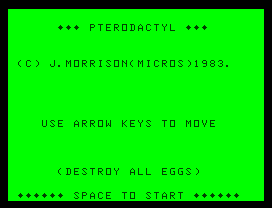
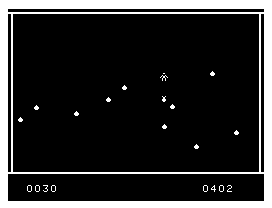
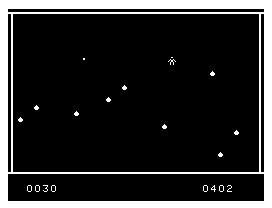
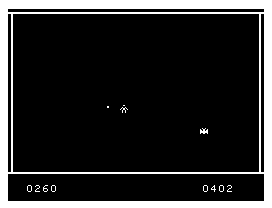
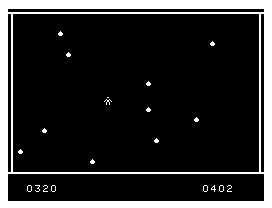



Reviews
There are no reviews yet.